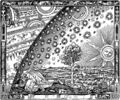Empyrean (nonfiction): Difference between revisions
Jump to navigation
Jump to search
No edit summary |
No edit summary |
||
| Line 2: | Line 2: | ||
The Empyrean was thus used as a name for the firmament, and in Christian literature, notably the Divine Comedy, for the dwelling-place of God, the blessed, celestial beings so divine they are made of pure light, and the source of light and creation | The Empyrean was thus used as a name for the firmament, and in Christian literature, notably the Divine Comedy, for the dwelling-place of God, the blessed, celestial beings so divine they are made of pure light, and the source of light and creation | ||
== Fiction cross-reference == | |||
<gallery mode="traditional"> | |||
File:720px-1024px-Flammarion.jpg|link=Flammarion engraving (nonfiction)|[[Flammarion engraving (nonfiction)|Flammarion engraving]]. | |||
File:Giant_dirigibles_to_operate_in_US.png|Giant Dirigibles to Operate in U.S., says 1922. | |||
</gallery> | |||
* [[Empyrées]] | |||
== Nonfiction cross-reference == | == Nonfiction cross-reference == | ||
* [[Flammarion engraving (nonfiction)]] | * [[Flammarion engraving (nonfiction)]] | ||
== External links == | == External links == | ||
Revision as of 08:25, 13 June 2016
Empyrean, from the Medieval Latin empyreus, an adaptation of the Ancient Greek ἔμπυρος empyrus "in or on the fire (pyr)", properly Empyrean Heaven, is the place in the highest heaven, which in ancient cosmologies was supposed to be occupied by the element of fire (or aether in Aristotle's natural philosophy).
The Empyrean was thus used as a name for the firmament, and in Christian literature, notably the Divine Comedy, for the dwelling-place of God, the blessed, celestial beings so divine they are made of pure light, and the source of light and creation

